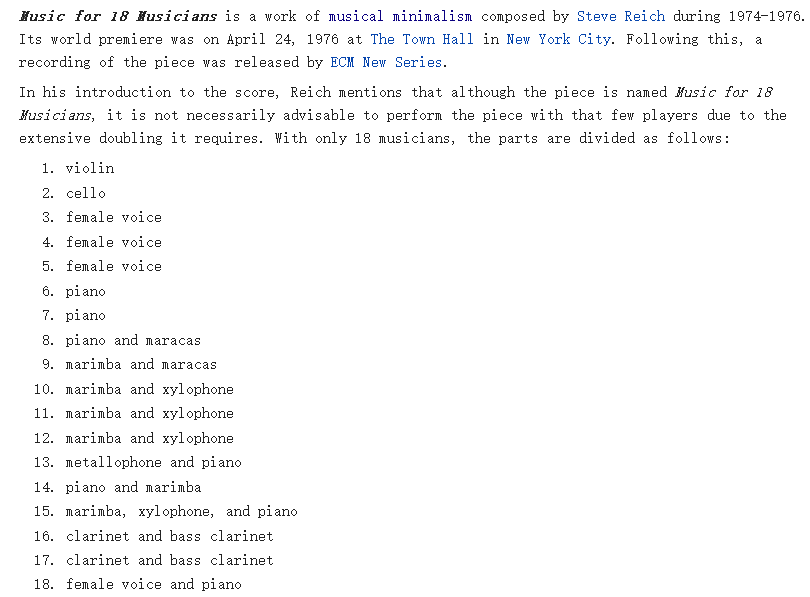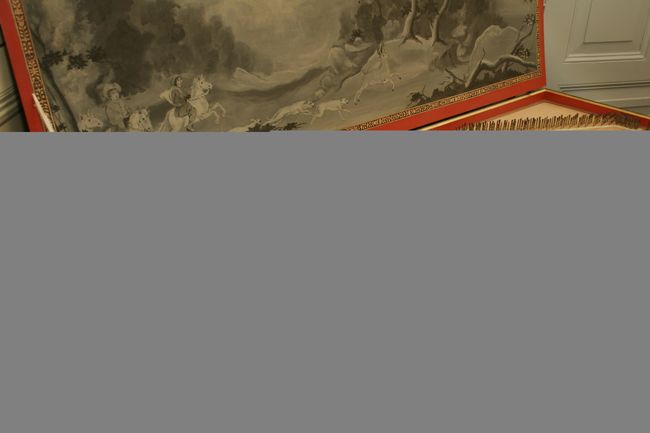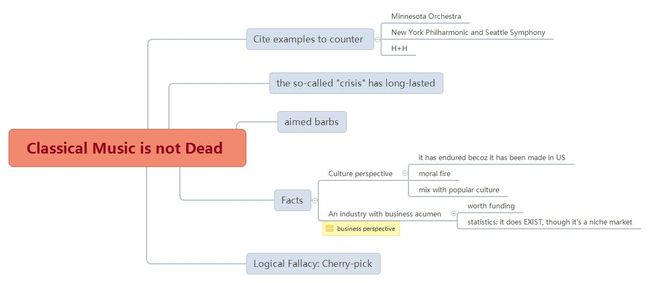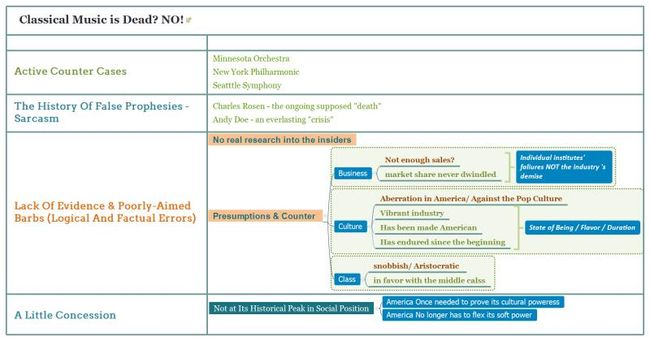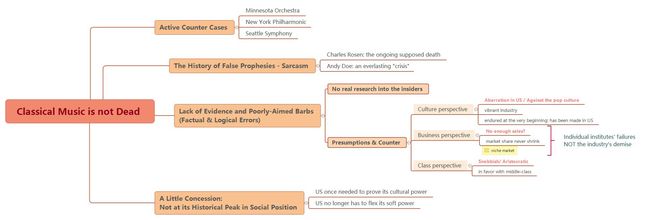>> Classical Music isn't Dead
Day20: Vocabulary
【图例注释】
[→] 我的笔记
[] Annie补充笔记
→ “Classical music in America is dead.” Those words rang out across the Internet last week…
ring out: to be heard loudly and clearly
(如果让我写可能会写成 "X presented blablabla in his artical"……)
e.g. ① Cheers rang out as the winner was announced.
② A shot rang out.
→ It was nothing we hadn't read before, but the timing of the latest obituary was particularly strange. Yes, New York City Opera folded last fall. But, a week before the Slate piece appeared, the Minnesota Orchestra emerged from a fifteen-month lockout crisis, and the day after publication the New York Philharmonic and Seattle Symphony announced energetic 2014-15 seasons.
obituary: a published announcement of a death, often accompanied by a short biography of the dead person
e.g. ① As far as his concerned, they're preparing his obituary and he doesn't care to attend the funeral.
② As the old saying goes, "There is no such thing as bad publicity except your own obituary."
fold: to collapse; fail
fold就是不下注了,牌交了,认栽。一群人赌钱, 你要是fold了,你之前的下注全部输掉,等于被踢出局。
→ all-in 就是押上全部身家, 豁出去的了意思,常常表达一个人很大的投入,全心全意不顾一切做一件事的心志和努力。
【拓展科普】美国人写东西动词老是从赌博、棒球、跑马上来
lockout: the temporary closing of a business or the refusal by an employer to allow employees to come to work until they accept the employer's terms
philharmonic: fond of or devoted to music; music-loving: used especially in the name of certain musical societies that sponsor symphony orchestras(Philharmonic Societies) and hence applied to their concerts (philharmonic concerts)
→ So what brought on this latest spasm of morbidity? And why is the American media so fixated on the supposedly imminent demise of classical music?
spasm: any sudden, brief spell of great energy, activity, feeling, etc.
e.g. The spasm of fear which crosses my heart summons it to my aid.
mobid: suggesting an unhealthy mental state or attitude; unwholesomely gloomy, sensitive, extreme, etc.
e.g. The business of writing obituaries may seem, at first glance, a morbid affair.
imminent: likely to occur at any moment; impending
e.g. With great difficulty and imminent danger he succeeded in reaching her.
demise: termination of existence or operation
e.g. Were they innocent victims or did they conduct themselves in a manner that would naturally lead to their demise.
→ This timeline shows just how long the "crisis" in classical music has lasted, and just how superfluous it is to declare 2014 the year the art form kicked the bucket.
superfluous: being more than is sufficient or required; excessive
e.g. Just two weeks ago, the experts were saying the Seoul summit would be superfluous as there was nothing left to decide.
To kick the bucket is an English idiom, considered a euphemistic, informal, or slang term meaning 'to die'.
kick the bucket--wikipedia
→ There is a creepy bloodlust to the doom-mongering of classical music, as though an autopsy were being conducted on a still-breathing body.
If you say that someone is driven by a bloodlust, you mean that they are acting in an extremely violent way because their emotions have been aroused by the events around them.
doom-monger: another name for doomsayer→ someone who always predicts the worst outcome
(monger: a promoter of something unpleasant)
e.g. You need not be a diehard doom-monger to worry that the eurozone's next crisis might be made not in Athens or Rome or Madrid, but in Paris.
autopsy: inspection and dissection of a body after death, as for determination of the cause of death
e.g. As an autopsy has yet to be completed, the official cause of death remains unknown.
【Word Origin】
1645–55; (< Middle French autopsie) < Greek autopsía a seeing with one's own eyes, equivalent to aut- aut- + óps(is) -opsis + -ia -y3
这个词用得很生动:文章title是“Classical music isn't dead”,阐述classical music remains alive;而反观Vanhoenacker的Classical Music in America is Dead一文就仿佛是在一个活生生的人体(a still-breathing body)上做autopsy,这种矛盾与荒谬给人以冲击。
→【new chamber ensemble】
【背景延伸】
Chamber music is a form of classical music that is composed for a small group of instruments—traditionally a group that could fit in a palace chamber or a large room. Most broadly, it includes any art music that is performed by a small number of performers, with one performer to a part (in contrast to orchestral music, in which each string part is played by a number of performers). However, by convention, it usually does not include solo instrument performances.
e.g. Rainbow Chamber Singers (上海彩虹室内合唱团)
Musical ensemble - Wikipedia
A musical ensemble, also known as a music group or musical group, is a group of people who perform instrumental and/or vocal music, with the ensemble typically known by a distinct name.
→ Why not interview members of the local orchestra and find out how real people make careers in a purportedly comatose industry?
If you say that something has purportedly been done, you mean that you think that it has been done but you cannot be sure.
e.g. He was given a letter purportedly signed by the Prime Minister.
comatose: lacking energy; in a state of coma
(coma: deep, prolonged unconsciousness caused by injury or disease)
e.g. While he lies comatose, she tells him the story of his life.
→ Why not talk to those graying audience members—contempt toward the elderly is a common theme in death-of-classical-music articles—and find out how their history of listening has improved their lives?
指“头发正在变灰的”的audience members,与破折号后的"the elderly"对应。
→ Instead, classical-music concern-trolls toss poorly aimed barbs.
concern troll: (Internet slang)Someone who posts to an internet forum or newsgroup, claiming to share its goals while deliberately working against those goals, typically, by claiming "concern" about group plans to engage in productive activity, urging members instead to attempt some activity that would damage the group's credibility, or alternatively to give up on group projects entirely.
troll: 网络的水军, 原意是小鬼
barb: A backward-facing point on a fish hook or similar implement, rendering extraction from the victim's flesh more difficult
联系上一段,作者说了很多“why not……”(都是作者认为doomsayers应该做的事情),而aimed barbs这一段开头紧跟着的是“Instead”。那我认为aimed barbs这一段就是说doomsayers是反其道而行之。这么理解的话,那aimed barbs这一段就应该是说doomsayers的关注点偏了。
→ What supports these jeremiads is the implicit idea that classical music is an aberration in the United States, something to be regarded with suspicion.
jeremiad: a long lamentation or complaint: in allusion to the Lamentations of Jeremiah
aberration: a departure from what is right, true, correct, etc. ; a deviation from the normal or the typical
e.g. Apart from the rather disturbing aberration of Snow, they gave the film the thumbs up.
→ 【Joseph Horowitz】
Joseph Horowitz (born 1948 in New York City) is an American cultural historian whose seven books mainly deal with the institutional history of classical music in the United States.
As a producer of concerts, he has played a pioneering role in promoting thematic programming and new concert formats. His tenure as Artistic Advisor and, subsequently, Executive Director of the Brooklyn Philharmonic Orchestra at the Brooklyn Academy of Music (1992–1997) attracted national attention for its radical departure from traditional functions and templates.
→ Talk to anyone who performs, composes, promotes, or organizes anything in this field and the blaze is palpable.
palpable: easily perceived by the senses or the mind; obvious
e.g. The excuse was a palpable lie.
→ It's also not an industry full of naive devotees without business acumen.
acumen: the ability to judge well; keen discernment; insight
Business acumen ("Business savvy" and "business sense" are often used as synonyms) is keenness and quickness in understanding and dealing with a "business situation" (risks and opportunities) in a manner that is likely to lead to a good outcome. Additionally, business acumen has emerged as a vehicle for improving financial performance and leadership development. Consequently, several different types of strategies have developed around improving business acumen.
→ Classical music was for pretentious snobs in 1935, according to the movies; classical music is for pretentious snobs in 2014, according to television.
music snob: A person who believes s/he has a more refined taste in music and has much more knowledge in the field of music in general. Every song and genre is unacceptable unless the snob happens to like it, then it is absolute perfection. Music snobs feel obligated to enlighten everyone with unwelcome critiques and irrelivant musical trivia.
pretentious: making claim to distinction or importance, esp undeservedly
→ 【Music for 18 musicians】
Steve Reich_Music for 18 Musicians >> http://music.163.com/album/1990014?userid=98963527 (@网易云音乐)
→ ……when the NBC Symphony Orchestra blared through home radios and Presidents regularly shook hands with conductors on television.
blare: to sound loudly and harshly
e.g. In the background there is rap music blaring from a radio.
→ But let's remember that the art's exalted status was as much the result of global politics as of middle-class tastes. America, an ascendant superpower with its own dark history of oppression, found classical music a useful tool for convincing the world of its cultural prowess.
exalted: high or elevated in rank, position, dignity, etc
e.g. The Prince enjoys his exalted position by an accident of birth.
Oppression is the cruel or unfairtreatmentof a group of people.
prowess: outstanding or superior skill or ability
e.g. This was their way of showing the great prowess they possessed as trainers.
→ To play the numbers game briefly: Vanhoenacker professes to be alarmed that classical recording presently constitutes only 2.8 per cent of the market.
profess: to affirm or announce (something, such as faith); acknowledge
e.g. But restaurants so often profess some sort of philosophy.
→ A cursory glance at industry reports would show that the market share has hovered around three per cent since the mid-nineteen-eighties.
A cursory glance or examination is a brief one in which you do not pay much attention to detail.
e.g. They need only take a cursory glance at history to find an answer.
→ Yes, it's a niche market, but so is most music in our polyglot society—not reigning supreme is not the same as ceasing to exist.
句意: 古典音乐是小众市场,不止古典乐,大多音乐在如今的多元化社会里都是这样的,不占统治地位——市场份额虽然不多,但也不是0——就不存在了。
Niche marketing is the practice of dividing the market into specialized areas for which particular products are made. A niche market is one of these specialized areas.
polyglot: widely diverse (as in ethnic or cultural origins)
e.g. a polyglot cuisine
Supreme is used in the title of a person or an official group to indicate that they are at the highest level in a particular organization or system.
→ The doomsayers also like to cherry-pick a few crisis-ridden institutions and use them to generalize about the art form itself.
Cherry picking, suppressing evidence, or the fallacy of incomplete evidence is the act of pointing to individual cases or data that seem to confirm a particular position, while ignoring a significant portion of related cases or data that may contradict that position. It is a kind of fallacy of selective attention, the most common example of which is the confirmation bias. Cherry picking may be committed intentionally or unintentionally. This fallacy is a major problem in public debate.
The term is based on the perceived process of harvesting fruit, such as cherries. The picker would be expected to only select the ripest and healthiest fruits. An observer who only sees the selected fruit may thus wrongly conclude that most, or even all, of the tree's fruit is in a likewise good condition. This can also give a false impression of the quality of the fruit (since it is only a sample and is not a representative sample).
→ …it can't be snuffed out through any combination of bankrupt orchestras and mediore album sales.
snuff out: to extinguish: to snuff out a candle.
→ to suppress; crush: to snuff out opposition.
→ (infml) to kill or murder: Many lives were snuffed out during the epidemic.
mediocre: of only ordinary or moderate quality; neither good nor bad; barely adequate
e.g. I would rather watch a great tennis player than a mediocre one, unless the latter is a friend or a relative.
→ 【The Boston Handel and Haydn Society】
The Handel and Haydn Society, familiarly known as H+H, is an American chorus and period instrument orchestra based in Boston, Massachusetts. Founded in 1815, it is the third oldest musical organization in the United States after the Stoughton Musical Society (founded in 1786) and the U.S. Marine Band (founded 1798), and the oldest continually performing arts organization in the United States.
period instrument: In the historically informed performance movement, musicians perform classical music using restored or replicated versions of the instruments for which it was originally written. Often performances by such musicians are said to be "on authentic instruments".
Day21: Mindmap
Original Mindmap1: 如何反驳古典音乐已死
对比安妮的Mindmap,初始版本不足及原因思考
1. 缺失concession部分→ 未深入思考关于classical music与lost its central position & flex soft power之间的逻辑关系;缺失class三级条目→ 没有理解doomsayers拿middle-class说事想表达什么。
2. "crisis has lasted" & aimed barbs,这两个subnodes与主题的关系没有理清→ 不清楚二者的论证角度,那么也就是不清楚如何论证的。
3. 尽管将论证角度分成了culture & biz,但是其下的条目未理清→ 对于细节的理解有些囫囵吞枣。还是那两个字:推敲!
4. subtitle不够精炼:语言功底 : ( (这个问题的反思见 Day22: 回顾与总结 )
→ Final Mindmap1:
→ Final Mindmap2(角度:作者如何展开论辩)
实际上两个角度展开的mindmap总体差异不大。Map2与Map1的区别在于2的concession部分在culture perspectives之后。
而这样行文更好吗?
我可以感受到,culture部分和concession部分在内容上是有一定联系的(作者的concession也恰恰是古典音乐在文化上的地位大不如前)。个人认为也不能说这样有多大的优点,只是从紧凑性上看,这样的行文条理没毛病。
Day23: 回顾与总结
>> Part 1
近两篇文章的导图作业,要求的展开角度都有两个(i.e.两张mindmap):一是探究作者的论点,二是梳理其行文脉络。前者是其辩驳的根本,即内涵;后者是其辩驳的外延,即形式。
这两个角度可谓是大面积地覆盖了吃透一篇文章逻辑的必要思辩点。同时,在画出两张导图后,还会引导出我本能的习惯——去思考这两种角度之间的区别是什么,为什么有这种区别(有必要吗,这样做让说理更加清晰精炼还是“简单复杂化”了)?这两篇文章算是我长时间使用思维导图以来的一次进阶。
而贯穿我6个topic的导图绘制过程,始终存在一个问题:subtitle永远不够凝练,细项条目的列示以及小部分逻辑存在些许混乱。Classical Music这篇文章让我感悟到,我的问题不在于语言的锤炼(当然还是有一部分的),更多的在于对句意的把握、对细部逻辑关系的梳理,很不到位!越是地道的文章,我的这种问题越明显。除却文化思维的差异,阅读时,语法在我理解文章的障碍里大约占了一半。所以我会考虑下一次参加安妮的语法班,扎实语法基础。
>> Part 2
期待已久的一个topic,不过看到后倒有一丁点失望了——总体看来这是一篇辩驳多于音乐本身的文章。不过结构清晰(那你还没把导图画好!),而且作者的反讽笔法着实令人眼前一亮,也让我对许多词句的体会也更深了些。如"There seems to be a deeper savagery at work, one that maniacally insists that a functioning industry reflect on itself, as though orchestra managers and opera intendants were oblivious to their own problems. “Listen to me!” the pundit demands, shaking classical music by its shoulders. “I have the stats. You’re dead.” " 读到这部分,尤其是as though后的句子,只觉讽刺语气扑面而来,我似乎看到了一个眼神冷漠呈摊手状的毒舌男形象(hhh)。
>> Part 3
小时总觉得Bach的Preludes and Fugues枯燥,可谓是童年阴影;但随着年岁增长,每个音符都变得愈发有韵味——对我而言,古典音乐是我在音乐上的启蒙,与她的羁绊烙印在血液里。Classical music is, absolutely, NOT dead. 一张张五线谱承载下来的是“美”,是前人的“情绪”与“记忆”。我们无法穿越时空回到过去,但音乐就是这样一个神奇而美好的存在,跨越时空将那些风景带到你眼前,将尘封的情绪融入你的身心。能和前人,和台上的音乐家,和琴友,在音乐里有情绪的共鸣,想想这也是件特别令人感动的事情啊。
从前听音乐是听旋律好听与否,如今听音乐是听旋律的结构、乐器的安排——听每件乐器、人声如何在旋律与节奏中碰撞、交融,与其中所表达的情绪。想起陈萨说:“对音乐的理解,是与生活一起渐变的过程。”那么,就这样继续走下去吧。
鲸鱼
2017年3月21日 凌晨
* 补充资料
>> TED_The transformative power of classical music (by Benjamin Zander, Conductor)
→ 视频中的两首曲子
① Frédéric Chopin: 24 Préludes, Op. 28 - 4. in E minor
② Piano Sonata No.16 in C, K.545Sonata facile- 1. Allegro
>> 古典音乐美国化:《美国:文化荒漠上的古典音乐大国》
-

